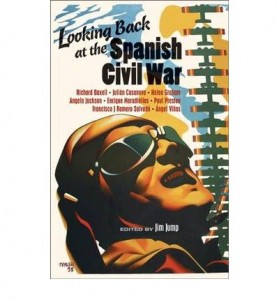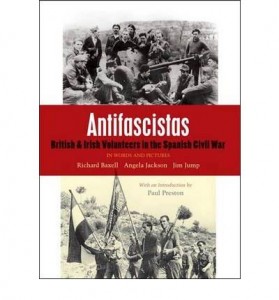Book Reviews: Spain’s legacy in Britain
 Looking Back at the Spanish Civil War: The International Brigade Memorial Trust’s Len Crome Memorial Lectures, 2002-2010. Edited by Jim Jump (London: Lawrence & Wishart, 2010).
Looking Back at the Spanish Civil War: The International Brigade Memorial Trust’s Len Crome Memorial Lectures, 2002-2010. Edited by Jim Jump (London: Lawrence & Wishart, 2010).
Antifascistas: British & Irish Volunteers in the Spanish Civil War. Edited by Richard Baxell, Angela Jackson, and Jim Jump. (London: Lawrence & Wishart, 2010).
The International Brigades—some 35,000 volunteers from 50-odd countries—stand in history as a unique transnational effort of the mid-20th century. “Honor for them in this lies:” wrote the U.S. poet Edwin Rolfe in “Elegy For Our Dead,”
that theirs is no special
strange plot of alien earth. Men of all lands here
lie side by side….
Rolfe’s internationalism was answering the British poets of World War I who wrote that in Flanders Field there was “one spot” that would forever be English. Indeed, to the IB volunteers, reacting against the nationalism that had led to blood baths in that first world war and the nationalism that infected the fascist minds of the 1930s, the best human response to anti-democratic movements required an international commitment symbolized by the famous poster showing black, white, and yellow people of the world united to save the Spanish Republic.
 It is no small irony, therefore, that many of the IB volunteers who survived both Spain and World War II returned home to form national veterans organizations honoring each country’s struggle against fascism. In the past few decades, monuments and plaques have sprung up worldwide to celebrate local and national heroes. And it’s no coincidence that scholars who have followed in their footsteps have often adopted a national perspective. (Full disclosure: my own work is no exception from that pattern.)
It is no small irony, therefore, that many of the IB volunteers who survived both Spain and World War II returned home to form national veterans organizations honoring each country’s struggle against fascism. In the past few decades, monuments and plaques have sprung up worldwide to celebrate local and national heroes. And it’s no coincidence that scholars who have followed in their footsteps have often adopted a national perspective. (Full disclosure: my own work is no exception from that pattern.)
Among the most active and successful of those groups is the International Brigades Monument Trust, founded in the United Kingdom in 2001 as a successor to the British veterans’ International Brigade Association. Its members, including many family relations of the volunteers as well as the country’s leading scholars of the Spanish Civil War, have undertaken numerous programs and projects to preserve the legacy of the struggle against fascism “as an inspiration to people around the world.” The scope of their activities can be found on their website and in their quarterly newsletters. The two books under review reflect their recent achievements.
Looking Back at the Spanish Civil War is a collection of the first 10 Len Crome annual lectures sponsored by the IBMT. These include Paul Preston’s tribute to the man for whom the series is dedicated, “‘No Soldier’: The Courage and Comradeship of Dr Len Crome,” describing one of the many medical personnel who gave generously to the Spanish cause and later served in World War II. As expected, the British side receives considerable treatment—essays by Richard Baxell and Angela Jackson, and Enrique Moradiellos’s “Albion’s Perfidy” about the pro-Franco response of the British government. But running through most of these essays is a strong international thread: Helen Graham’s “The Return of Republican Memory”; Ángel Vias’s “September 1936: Stalin’s Decision to Support the Spanish Republic”; Julián Casanova’s “History and Memory.”
Antifascistas is more of a picture book designed to accompany a traveling exhibition honoring the role of British and Irish volunteers in Spain. Paul Preston’s introductory essay contextualizes the story, and the editors have added clear explanation of the various aspects of the Spanish war involving British soldiers, medical aid, journalists, the arts, etc.
Separately and together, this historical work is good—have no doubt about it—and reflects the growing interest around the world in matters related to the Spanish Civil War and its legacy. Partly the result of new archival discoveries, partly because of the passing of the generation that lived and fought the war, the new scholarship has effectively shifted the historical narrative closer to its original, pre-Cold War position.
Most recent writing emphasizes that the war in Spain had long, indigenous roots; stresses selfish national interests in Britain, France and the United States for the failure to prevent fascist expansion; and treats the IB volunteers as heroic anti-fascists (rather than dupes of Stalin). On these grounds, the Spanish Civil War was a fight between an elected democracy and a fascist-military rebellion rather than a war between fascism and communism (the Cold War version). Instead of seeing the Spanish war as a precursor or “dress rehearsal” for a world war, it appears as it once was seen by its contemporaries, the first battlefield of World War II.
Peter N. Carroll is Chair Emeritus of the Board of Governors of ALBA.













